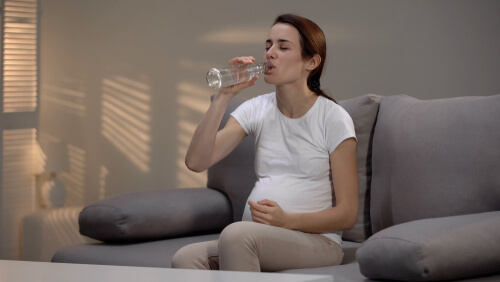Drug and Alcohol Rehabs for Pregnant Women and Mothers Near Me
Statistics of Pregnancy and Addiction
Substance abuse in pregnancy can have severe consequences on the health of the mother and the child. Unfortunately, this is still not such a rare phenomenon. According to a 2012 survey, 5.9% of pregnant women in the U.S. use illicit drugs, 8.5% drink alcohol, and 15.9% smoke cigarettes.1
Substance Abuse and Pregnant Mothers
Women are generally at the highest risk for developing a substance use disorder during their reproductive years (18–44), especially ages 18–29.2 It is therefore not surprising that there are quite a few cases of addiction disorders among pregnant women.
Statistics show that the most frequently used substance in pregnancy is tobacco, followed by alcohol, cannabis, and other illicit substances. Moreover, the epidemic of opioid prescription misuse is also visible in the population of pregnant women, with a recent increase in the number of cases of opiate abuse in pregnancy.2
Implications for Rehab Programs for Pregnant Women
It is highly recommended that pregnant women who want to quit their addiction seek professional help. In certain cases, trying to break the addiction without medical help may cause serious distress for the baby.3 This is why drug treatment programs for pregnant women are carefully designed to cater to their particular needs.
On the other hand, research that explored the characteristics of addiction and treatment-seeking in pregnant women established that getting help is not always easy.4 There is a pronounced necessity for drug treatment programs for pregnant women that are more accessible so that more women from all areas would be able to receive treatment appropriate for their condition.5

What Are the Risks of Substance Abuse in Pregnancy?
Substance abuse in pregnancy can be very harmful because the substances that the mother uses reach the fetus via the placenta and the umbilical cord. This increases the risk of pre-term labor, miscarriage, or stillbirth. Moreover, the adverse consequences of addiction in pregnancy may not emerge immediately. There is a growing body of evidence of long-term effects of substance abuse such as respiratory diseases or behavioral issues in children.1
These are the health risks per substance type:
- Alcohol: Miscarriage, stillbirth, infant mortality, fetal growth restriction, congenital anomalies.2
- Tobacco: Miscarriage, ectopic pregnancy, placental insufficiency, low birth weight, fetal growth restriction, preterm delivery, childhood respiratory disease, and behavioral issues.1
- Marijuana: Fetal growth restriction, as well as withdrawal symptoms in the baby.1
- Opioids: Maternal death, fetal growth restriction, preterm labor, stillbirth, birth defects, neonatal abstinence syndrome (when the baby becomes dependent on the substances used by the mother during pregnancy).6
- Cocaine: miscarriage, preterm labor, placental abruption, congenital anomalies, poor feeding, lethargy.1
Furthermore, research data suggest that the babies of mothers who both drank and smoked beyond their first trimester of pregnancy have 12 times more chance of dying from the sudden infant death syndrome (SIDS) compared to those who were unexposed or exposed only in the first trimester.7
In addition to direct health risks, theNational Institute on Drug Abuse also warns about the following indirect risks that are closely linked to substance abuse in pregnancy:8
- Malnutrition and poor prenatal care
- Increased risk for maternal infection (such as HIV or hepatitis)
- Dangers from drug seeking (such as violence and incarceration)
How Drug Treatment Programs for Pregnant WomenWork
Although the effects of substance abuse in pregnancy can be severe, there is encouraging evidence that treatment programs for pregnant addicts can result in improved birth outcomes including delivery of drug-free infants and babies with better birth weights.9
The Addiction Treatment Process for Pregnant Mothers
As any other addiction treatment, this one also involves a period of detoxification, when a substance is eliminated from the body. It is important that this process is medically supervised in order to mitigate withdrawal symptoms that can harm the baby. In cases of opioid addiction, methadone and buprenorphine have been shown to be safe and effective in drug treatment programs for pregnant women.8
As it may be the case with any substance use disorder, a pregnant woman may have co-occurring psychological disorders, such as depression or anxiety. These need to be treated so that the person would resolve the issues that have led to substance abuse. There are various forms of counseling, behavioral therapy, family therapy programs and counseling, support groups, and so on.